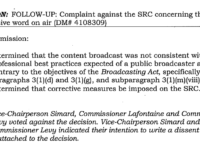The first post in this series on Bill C-18, the Online News Act, focused on the problematic approach to what constitutes “making news content available”, as it encompasses everything from indexing to linking to news stories without reproducing the actual text. The approach raises serious risks to the free flow of information online and expands the law far beyond reasonable expectations of what “use” of news articles might mean. But the problems with expansive definitions in the bill are not limited to the “making available” provision. Bill C-18’s definitions for “news content”, “news business”, and “news outlet” are also exceptionally broad, raising their own series of concerns.
Blog
Why the Online News Act is a Bad Solution to a Real Problem, Part One: The Risk to Free Flow of Information
Since its introduction in early April, the Online News Act (Bill C-18) has flown below the public’s radar screen. There have been a few op-eds and considerable coverage on my blog (I’ve posted here, here, here, here, here, here, here, here and released podcasts on the bill with Sue Gardner and independent digital media publishers Farhan Mohamed and Jeff Elgie) but Canadian Heritage Minister Pablo Rodriguez has largely been content to rush the bill through the parliamentary process with little debate. In fact, after Rodriguez left the CBC’s Vassy Kapelos visibly puzzled, he has said little about it. He has never given a speech on the bill in the House of Commons and the government successfully cut off debate after allocating just two hours to it. Bill C-18 is now headed to the Standing Committee on Canadian Heritage with hearings that could start as soon as the end of this week.
This post marks the first in a lengthy series that explain why the bill is a bad solution to a real problem. The series starts with posts that examine some of the specifics in the bill, including problematic definitions for making available news, news businesses, and even the definition of news itself. Once I’ve laid the foundation, the series will highlight some of the implications of the bill, including breaches of Canada’s international trade, treaty, and constitutional obligations; the risk it will hamper efforts to combat misinformation; and the plethora of market problems it would create related to government interference, an independent press, competition, and our dependence on big tech.
The Bill C-11 Hearings Are Back, Part Four: The Risks of a Trade Challenge and Tariff Retaliation
The first three posts in this series on Bill C-11 have focused on the risks of regulating user content, the risks to Canadian creators, and the risks of increased consumer costs and less competition. Today’s post identifies another risk with the bill: the prospect of a trade challenge under the CUSMA that could lead to billions on tariff retaliation that target some of Canada’s most important economic sectors. The possibility of a U.S. trade battle over the bill is no idle speculation even if downplayed this week by an official from Global Affairs. This summer, U.S. Trade Representative Katherine Tai raised the issue directly with Canadian Minister of International Trade Mary Ng. While the Canadian readout of the meeting notably excluded any reference to the issue, it was cited in the U.S. readout of the meeting:
The Bill C-11 Hearings Are Back, Part Three: The Risks of Higher Consumer Costs, Less Competition, and Little New Money for Film Production
The first two posts of this series on Bill C-11 focused on the risks to user content and Canadian creators. This post picks up on the implications of the bill for consumer costs and choice. In short, at a time when political parties are focused on affordability and inflation, the Bill C-11 effect is likely to increase consumer costs and decrease choice. There is no magic solution that results in hundreds of millions of new money entering the system without someone paying for it. It is fairly clear that that someone will be Canadian consumers as streaming services either hike Canadian fees to account for their new costs or shun the market altogether. It should be noted that it doesn’t need to be that way: a bill that establishes thresholds to exclude smaller services would limit the negative effects on competition and a sufficiently flexible approach to Canadian contributions would recognize that the large streaming services already invest billions in Canada.
Misleading on Bill C-11: Why Did the CRTC Sit on the Radio-Canada Decision For Nearly Eight Months?
Days after Bill C-11 passed in the House of Commons, the CRTC released its decision involving Radio-Canada and the use of the N-word in a broadcast. The decision sparked an outcry in Quebec and raised concerns that the Commission did not feel constrained by the Charter of Rights and Freedoms in its decision. Indeed, given that the majority of the Commission ignored the Charter and freedom of expression altogether, the decision signalled how Bill C-11 could be used to regulate Internet content the CRTC deems contrary to Broadcasting Act policy objectives. Two of the lingering questions with the case involved timing and who had been involved: the complaint had reached the CRTC in 2020, yet the decision was released nearly 18 months later only after Bill C-11 passed the House of Commons. I asked the CRTC for the full commission minutes to better understand who was involved in the case and when the issue was debated and decided. The Commission responded that all of this information was only available through the Access to Information Act. While I find this level of secrecy astonishing – there is no reason for the Commission to not publish who was involved in decisions and to make its minutes publicly available by default – I filed the request.











